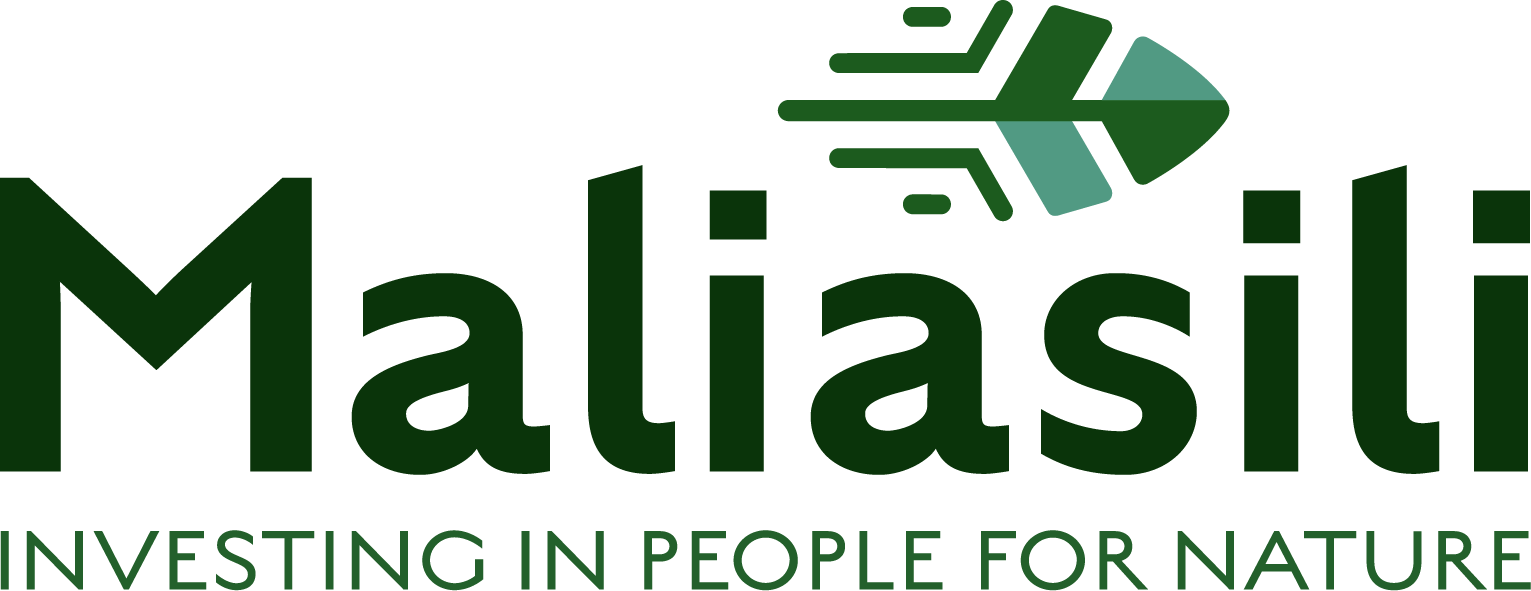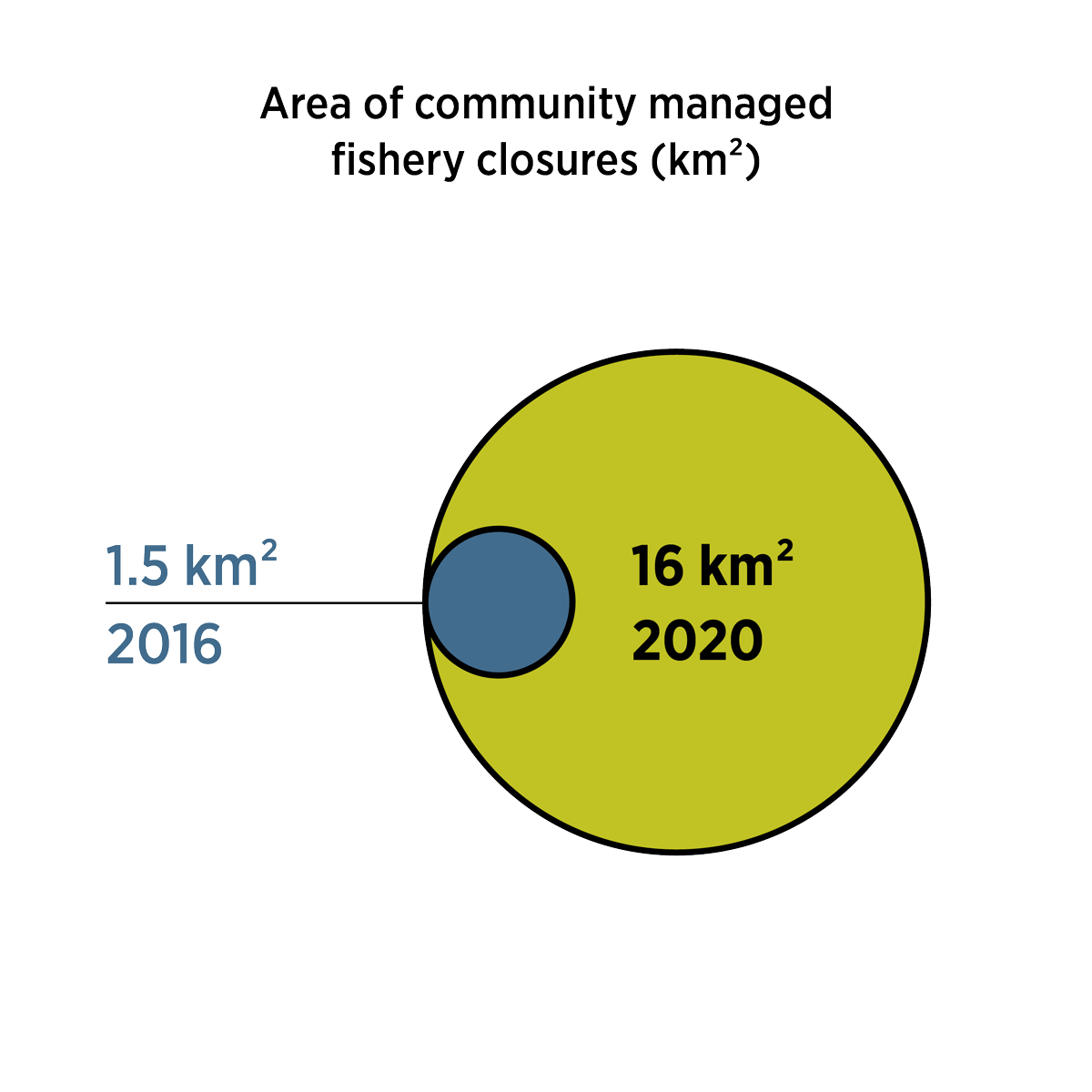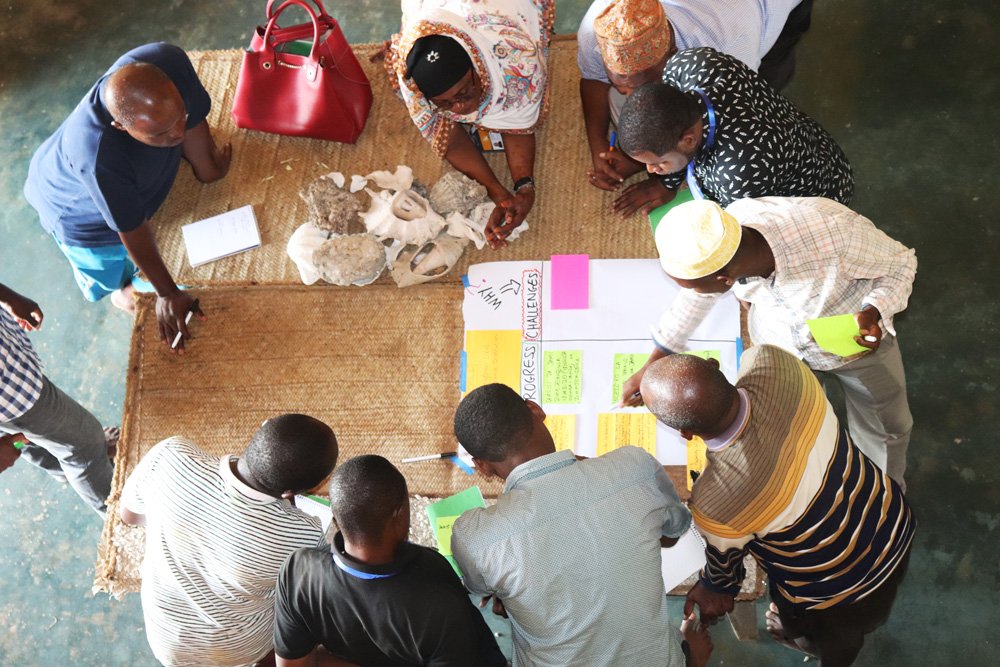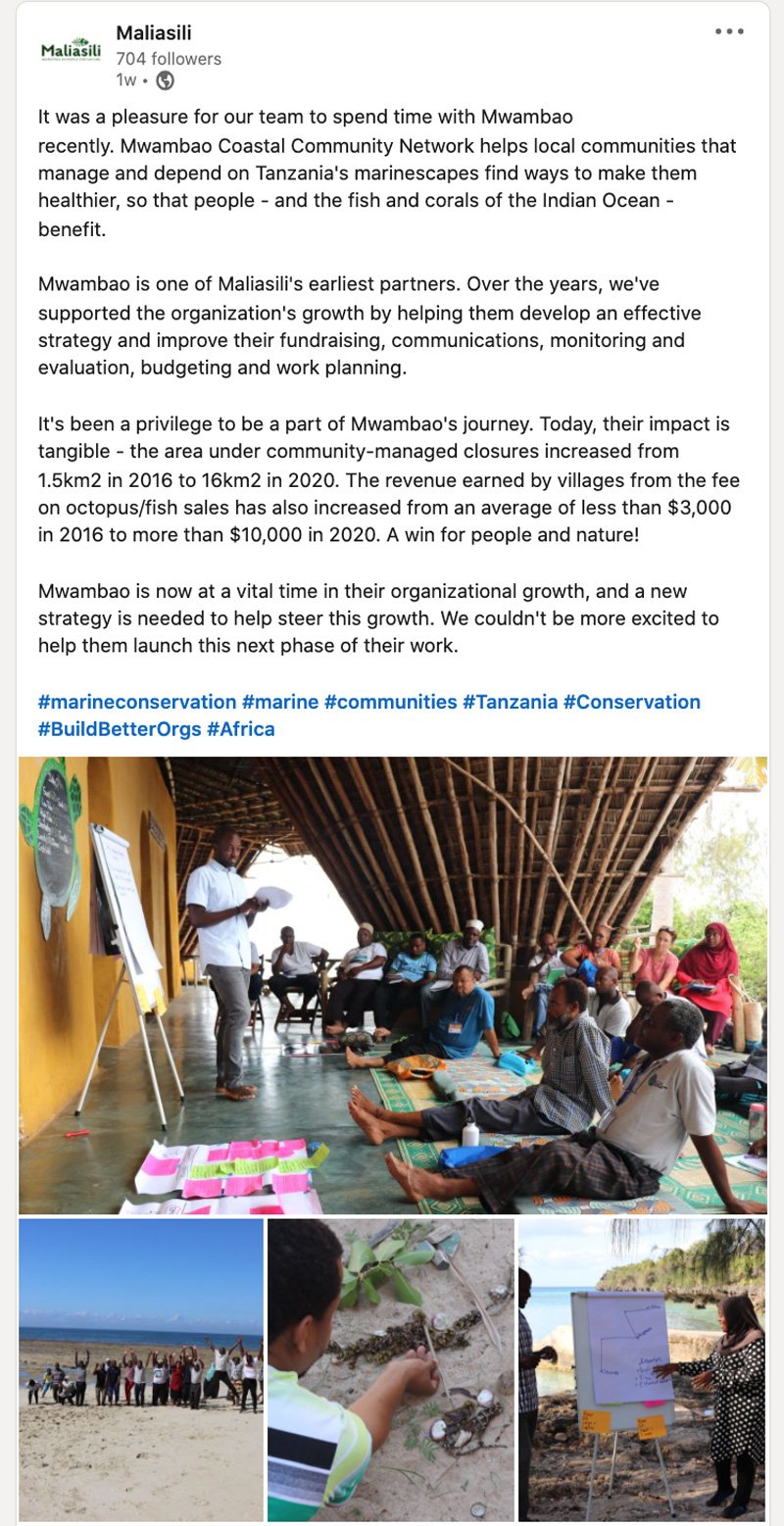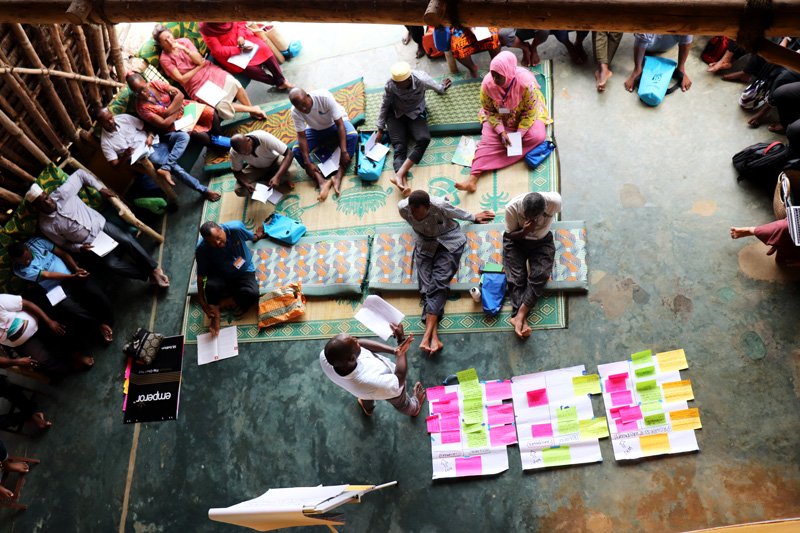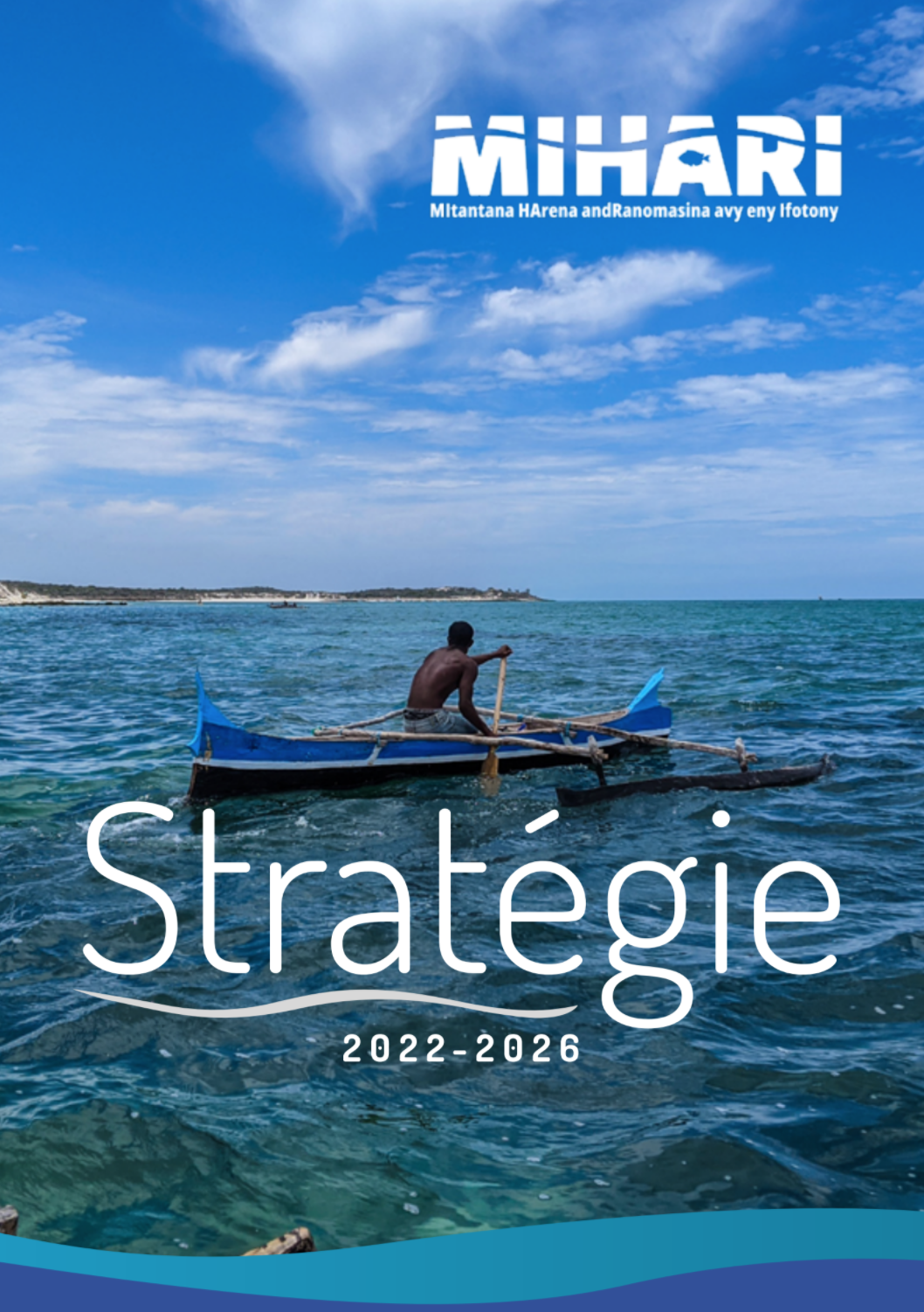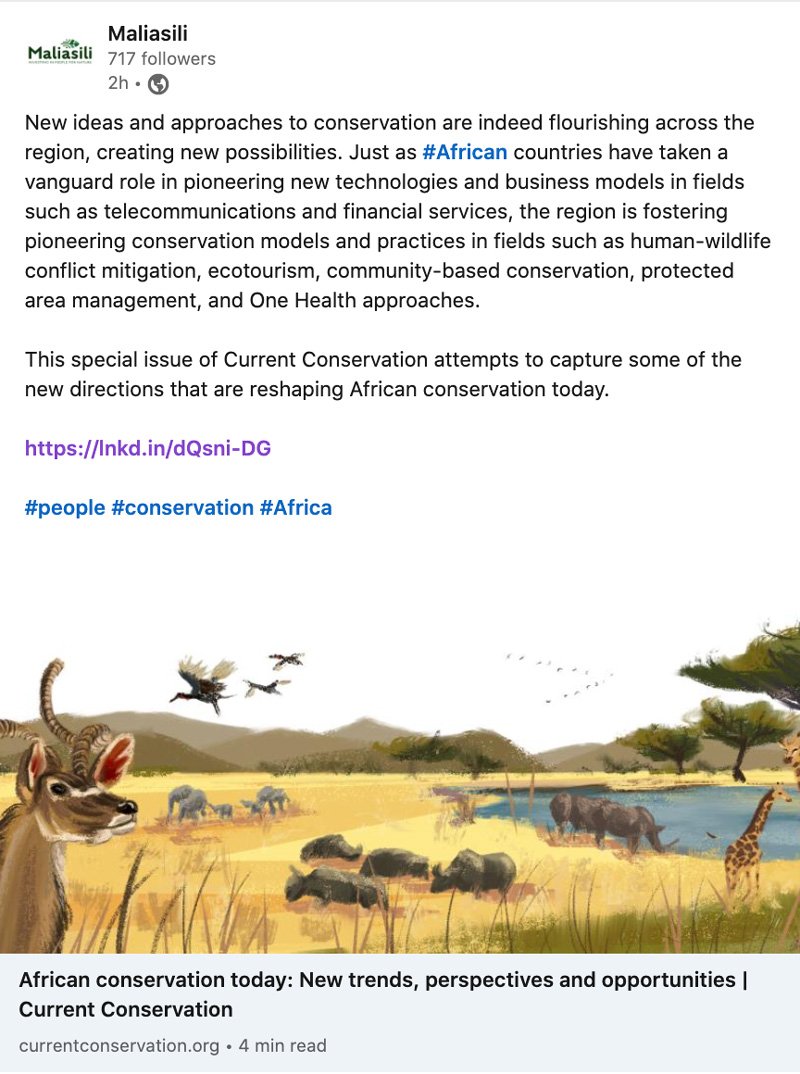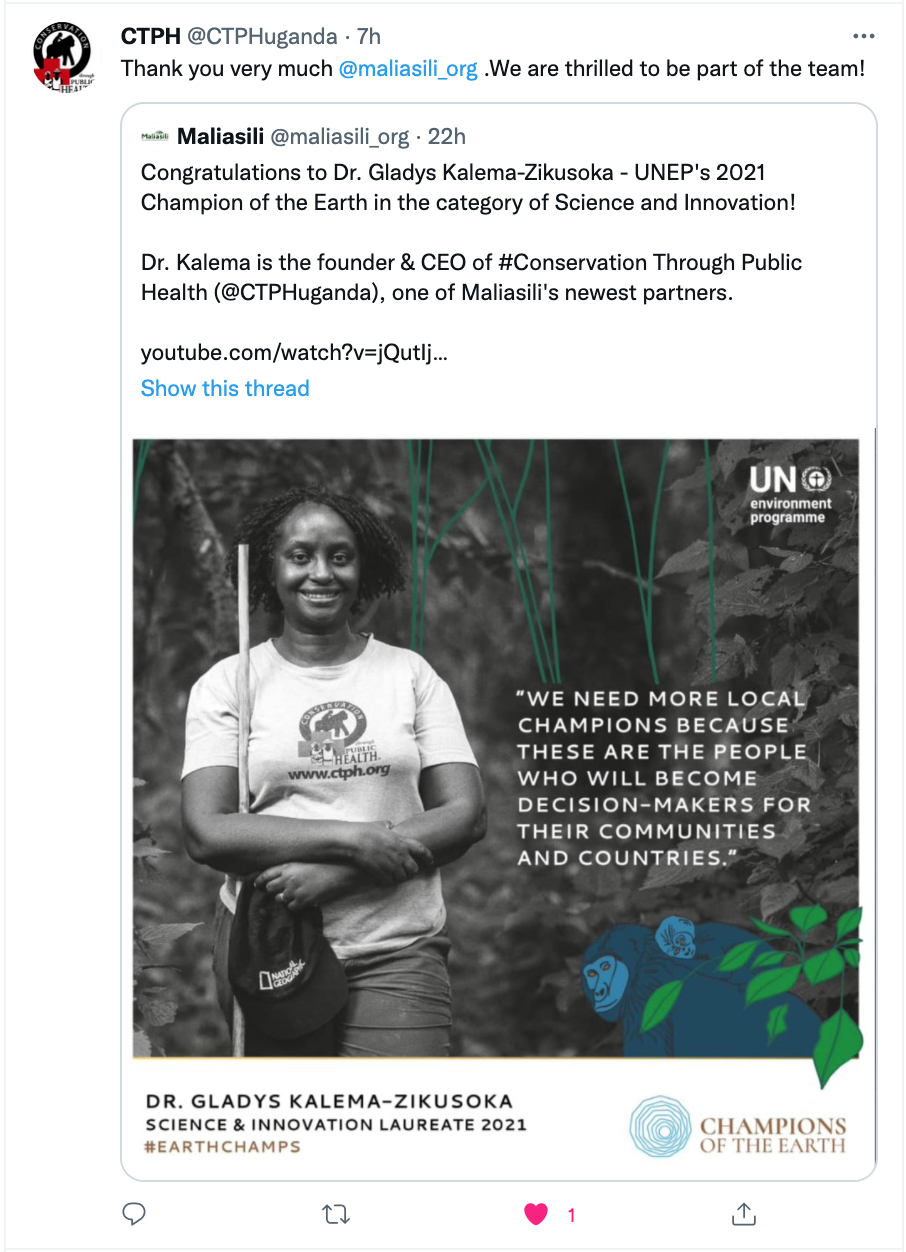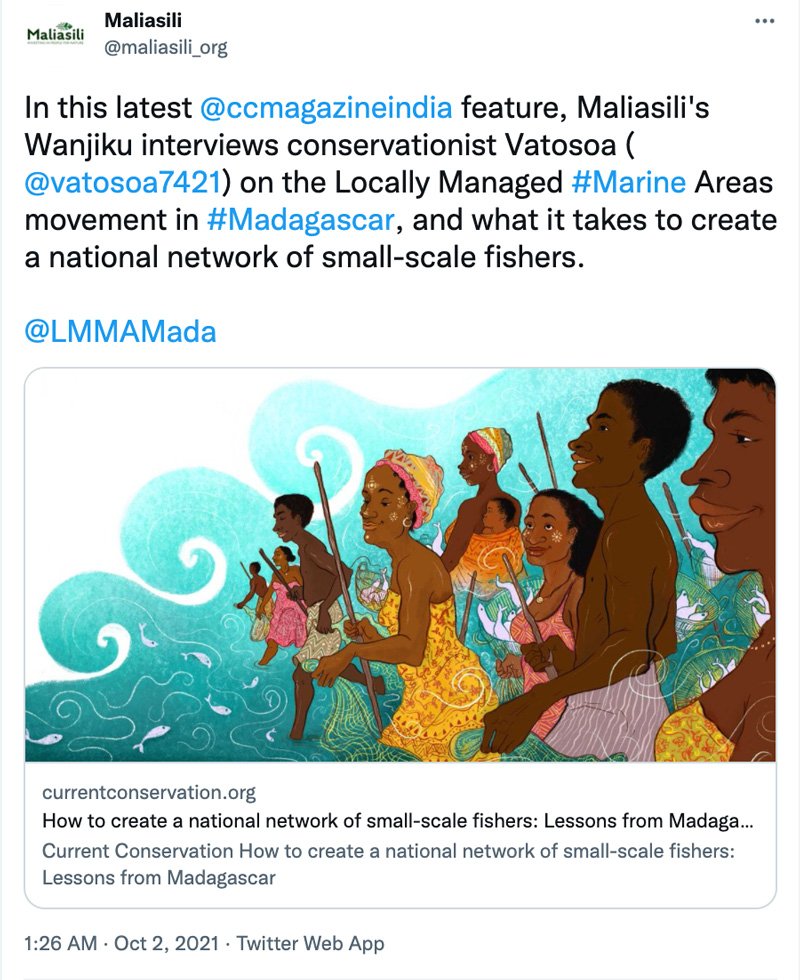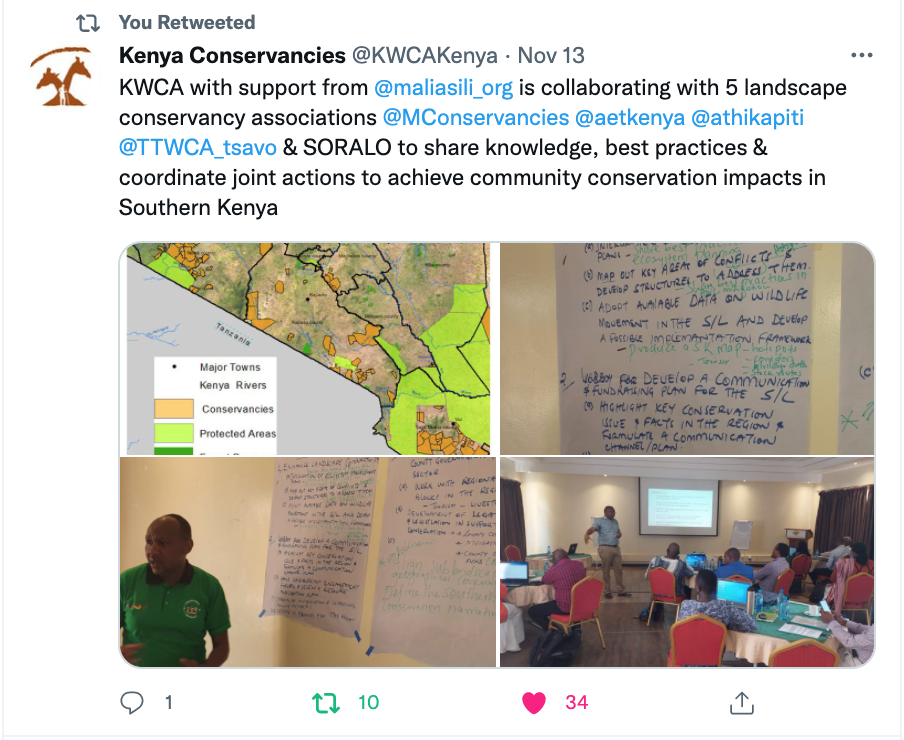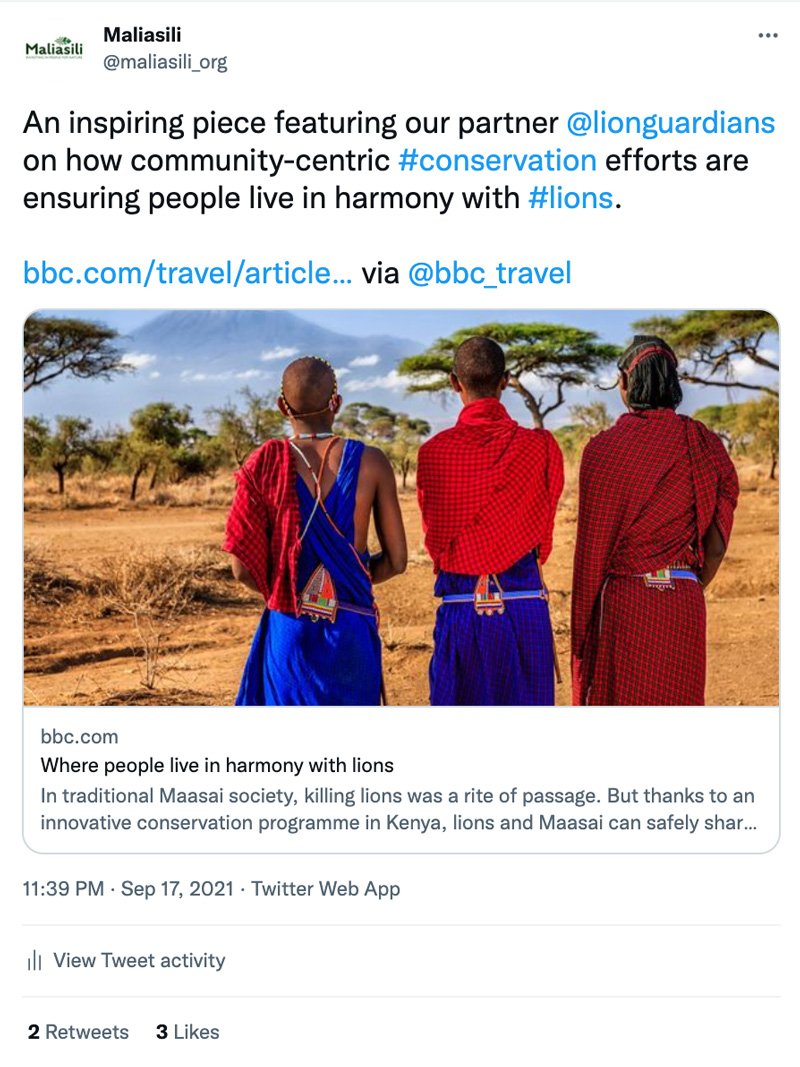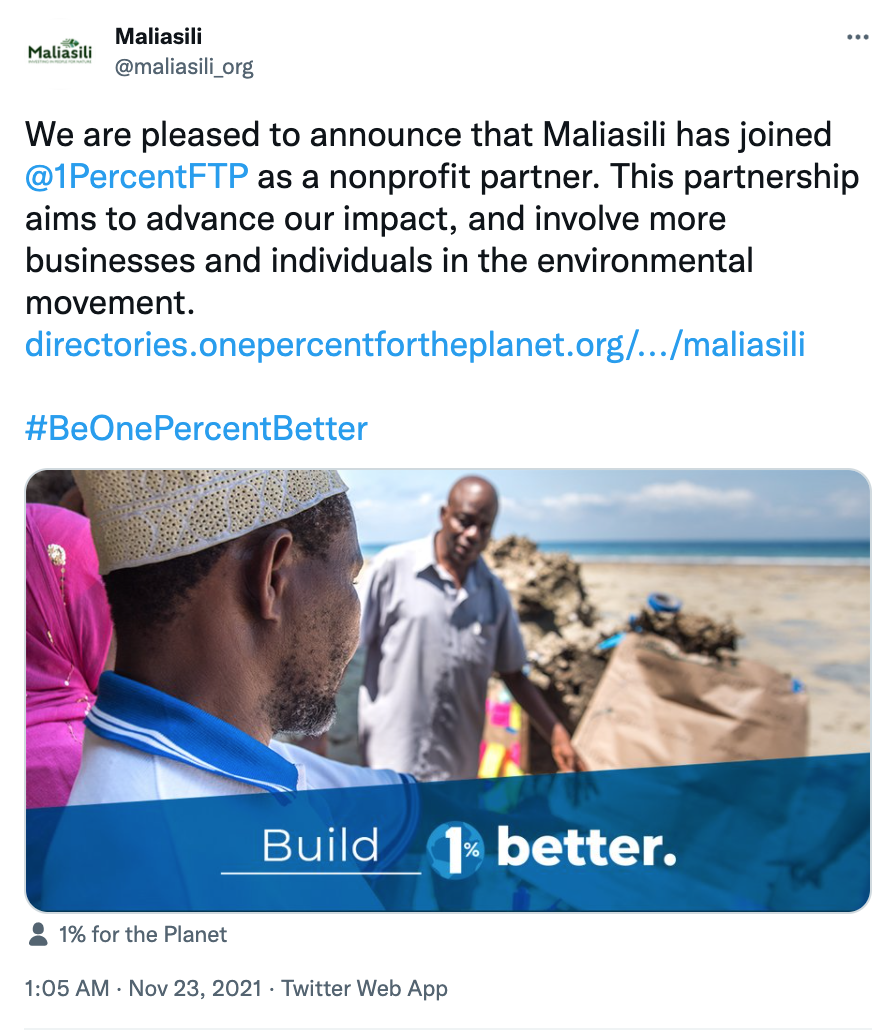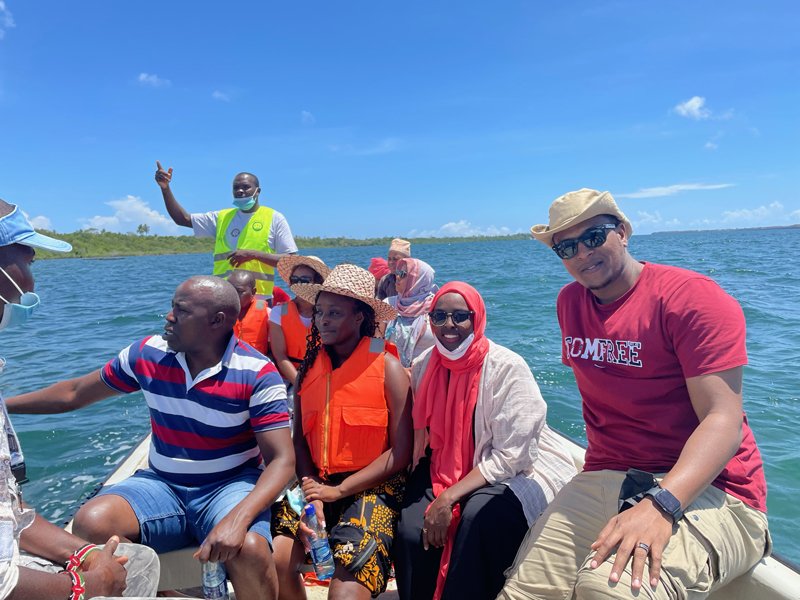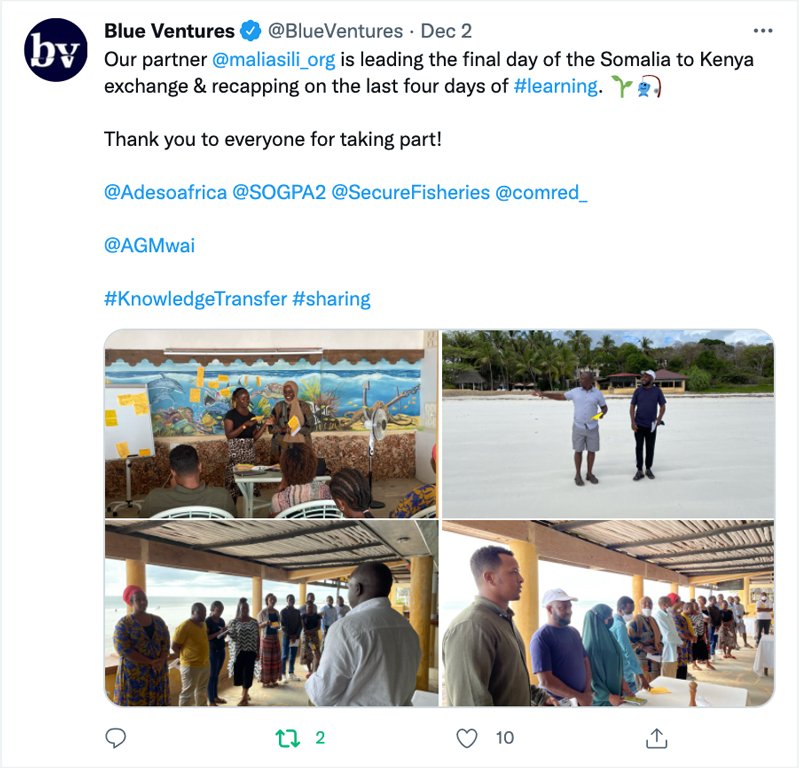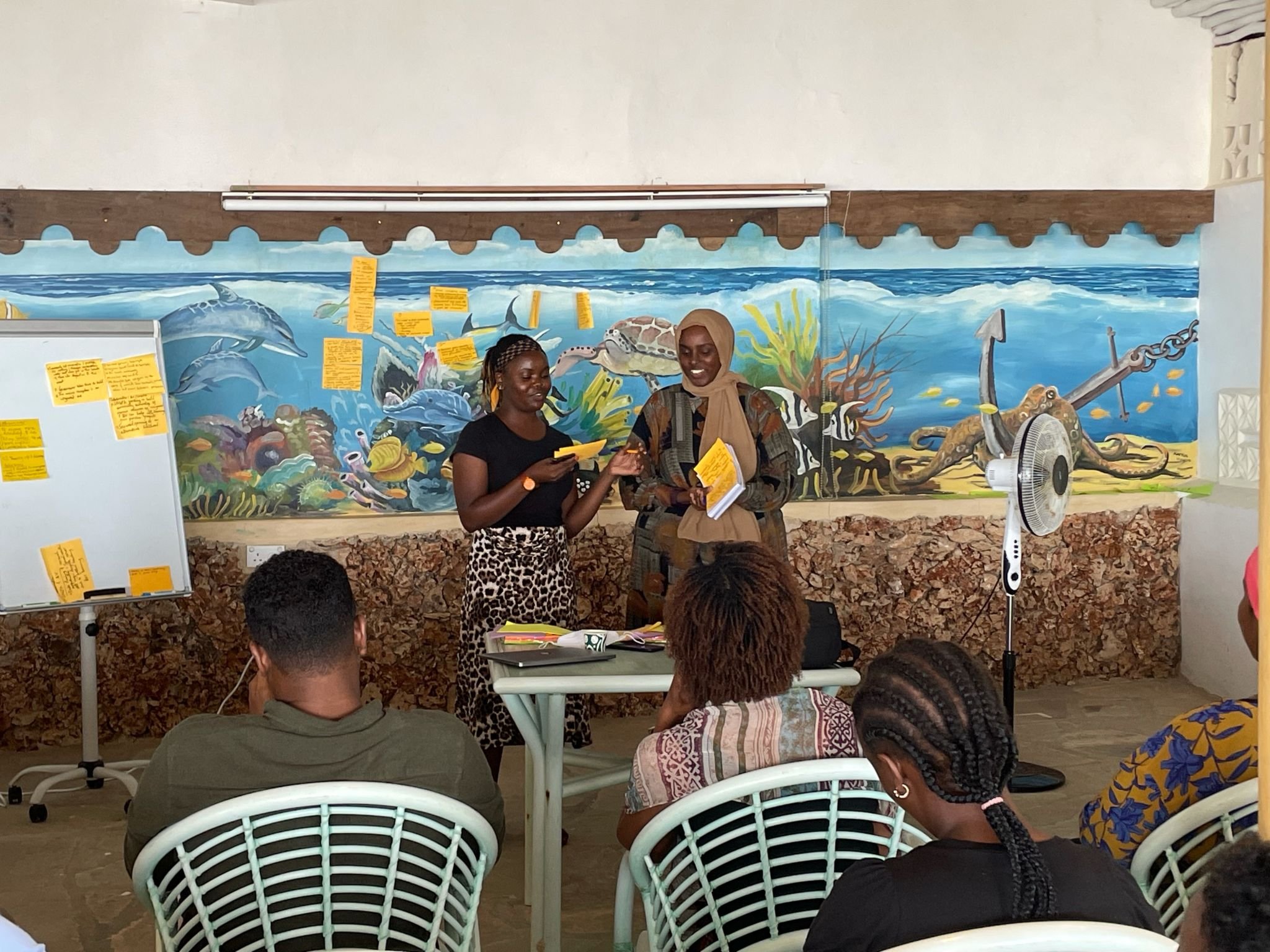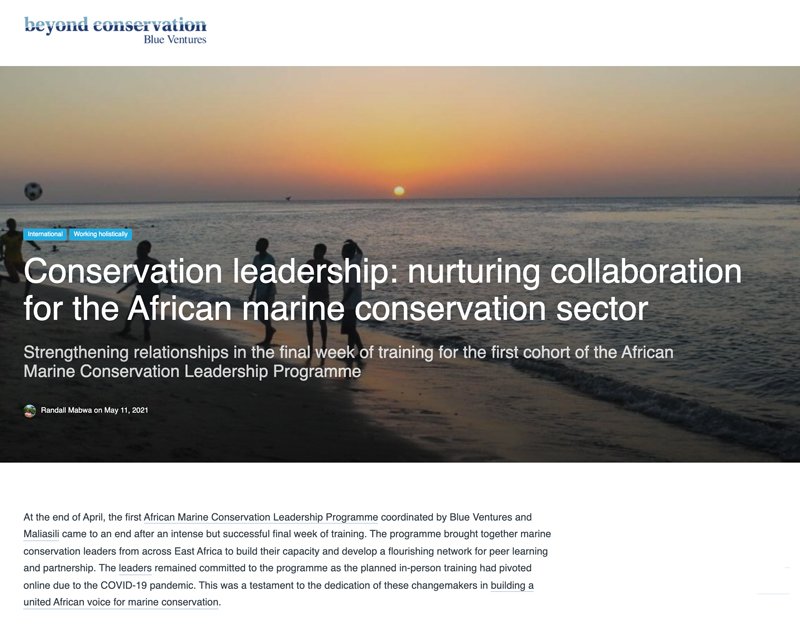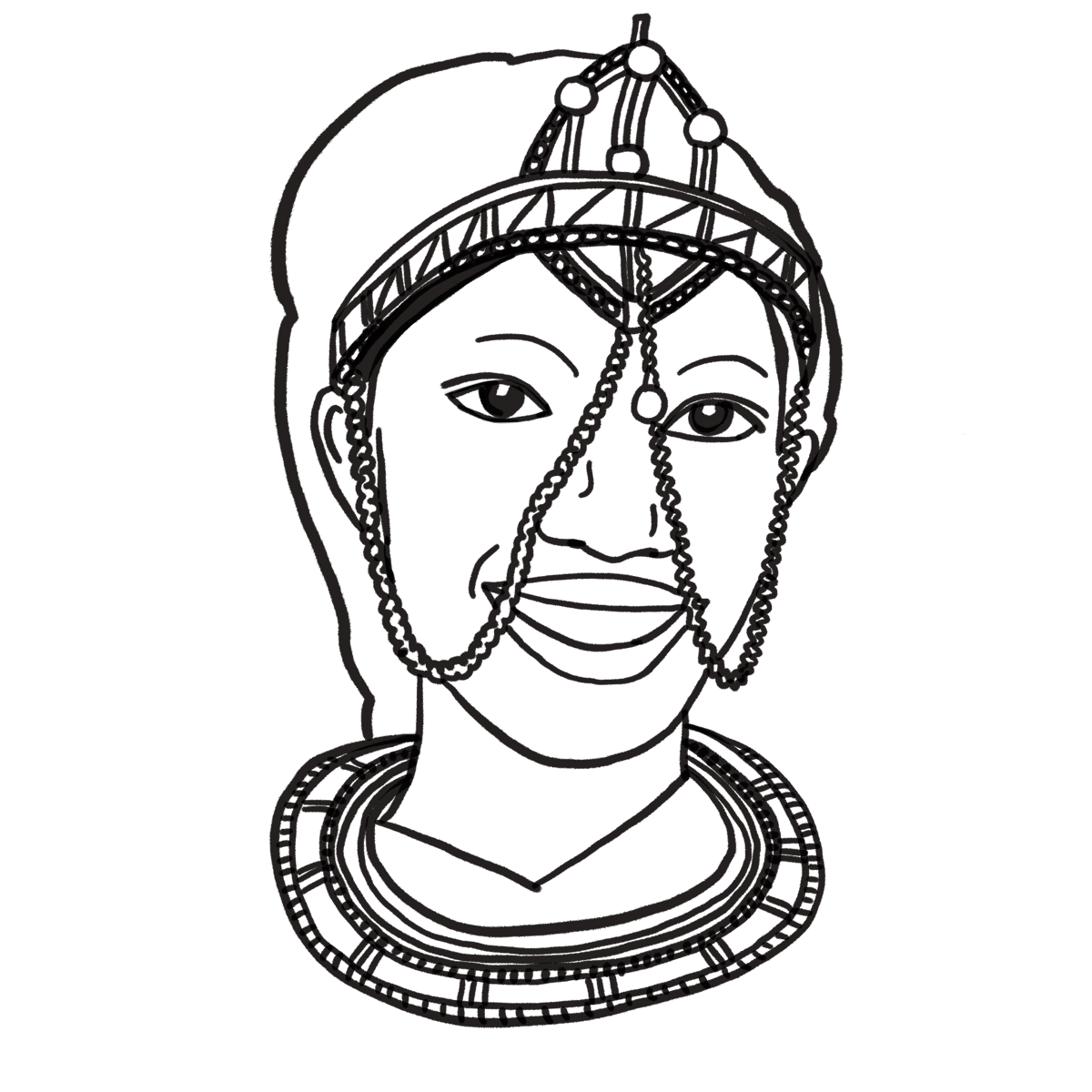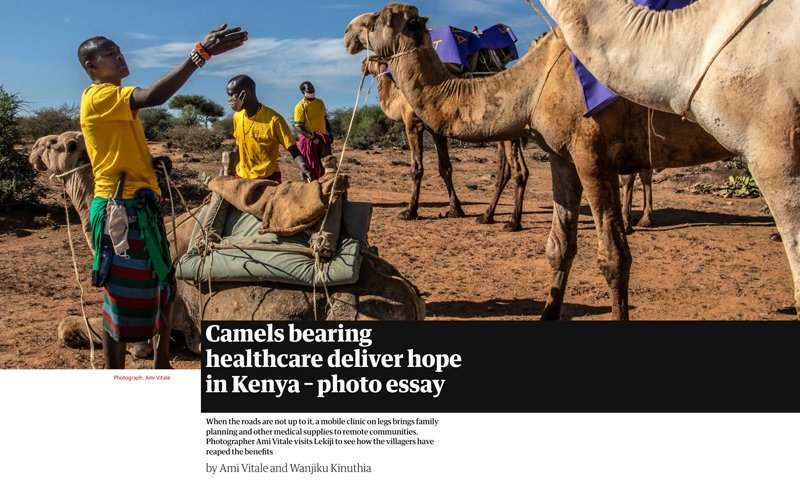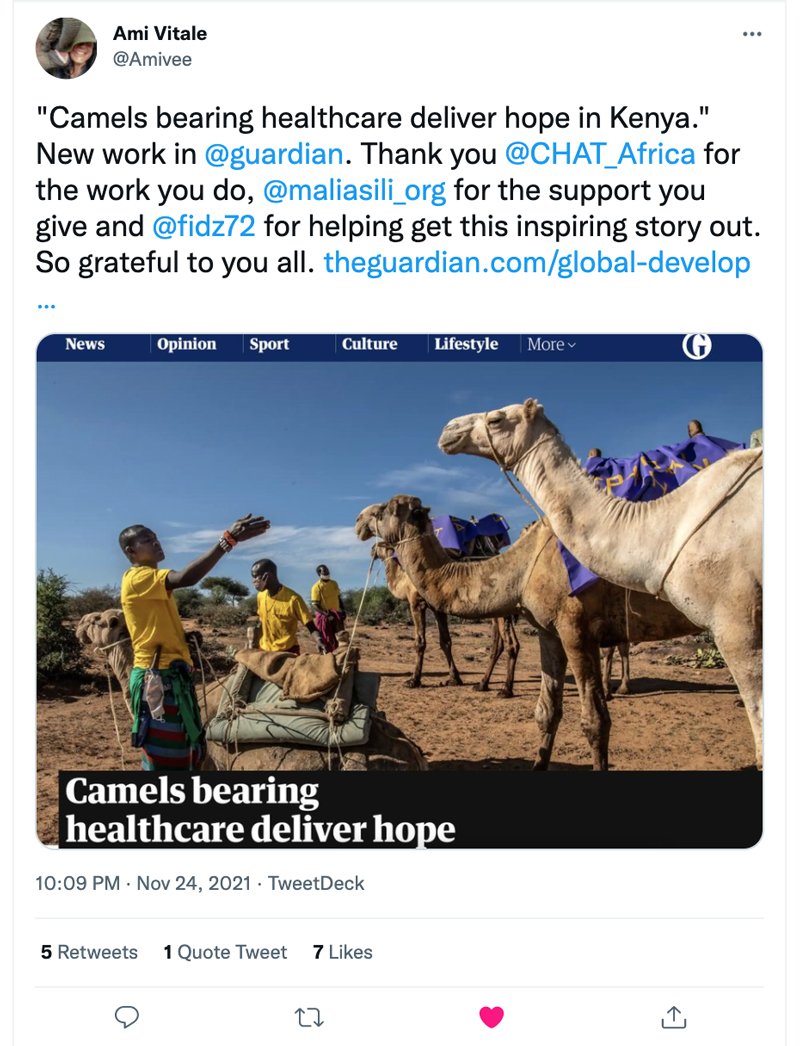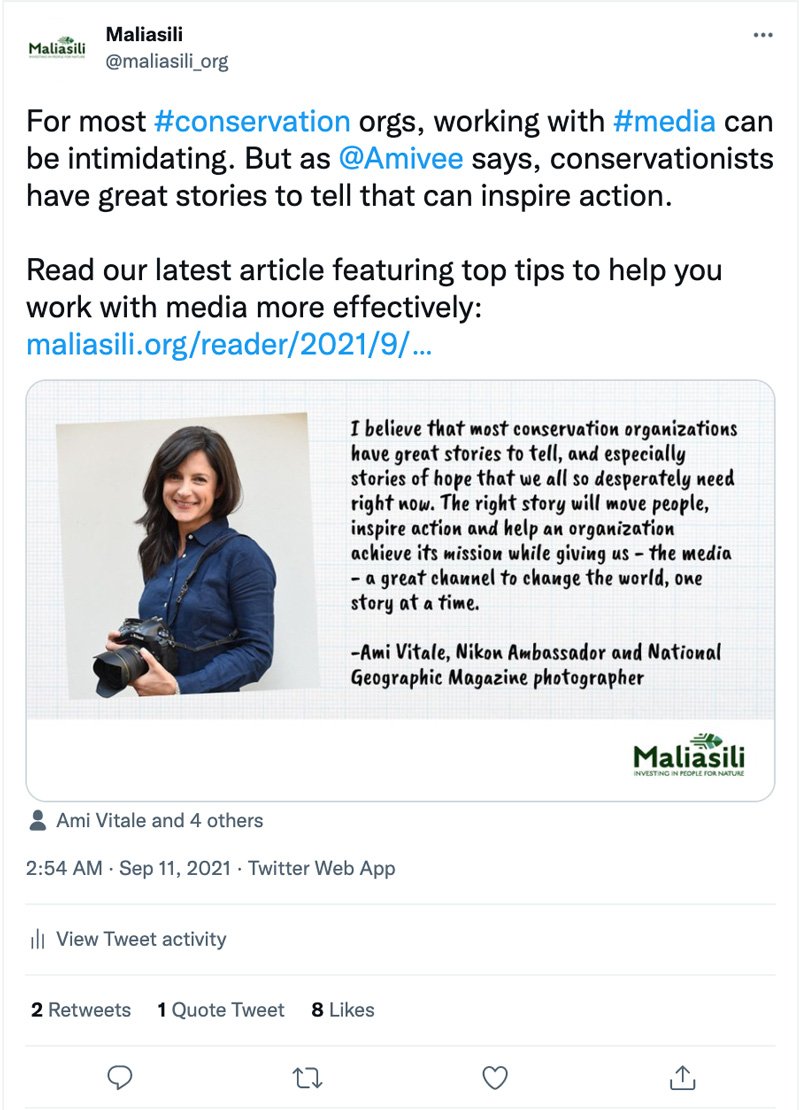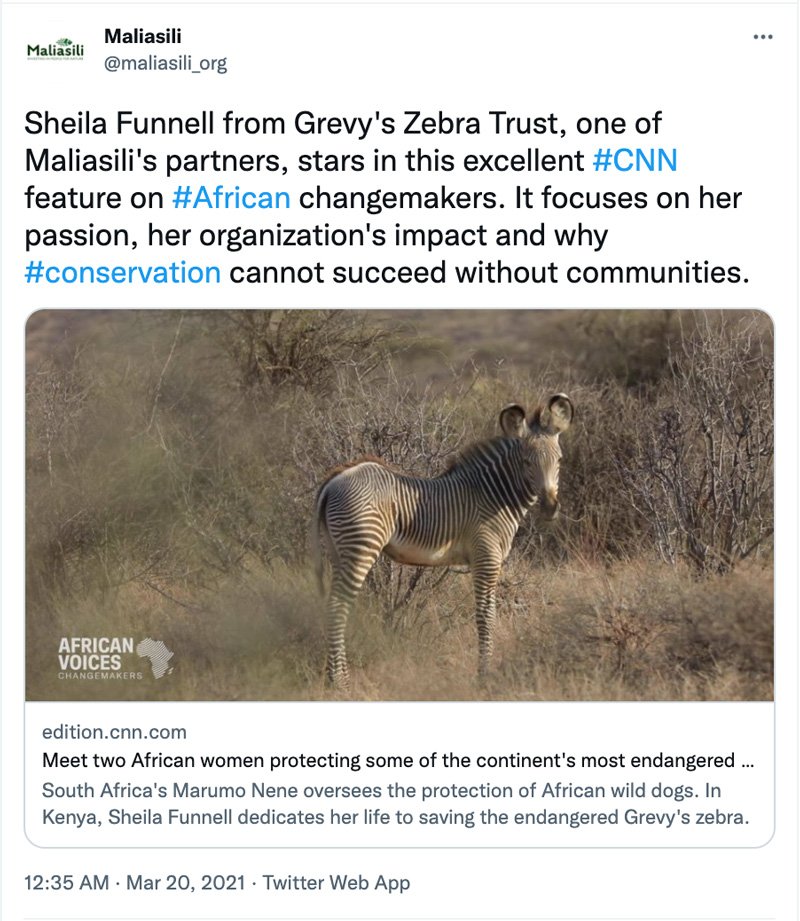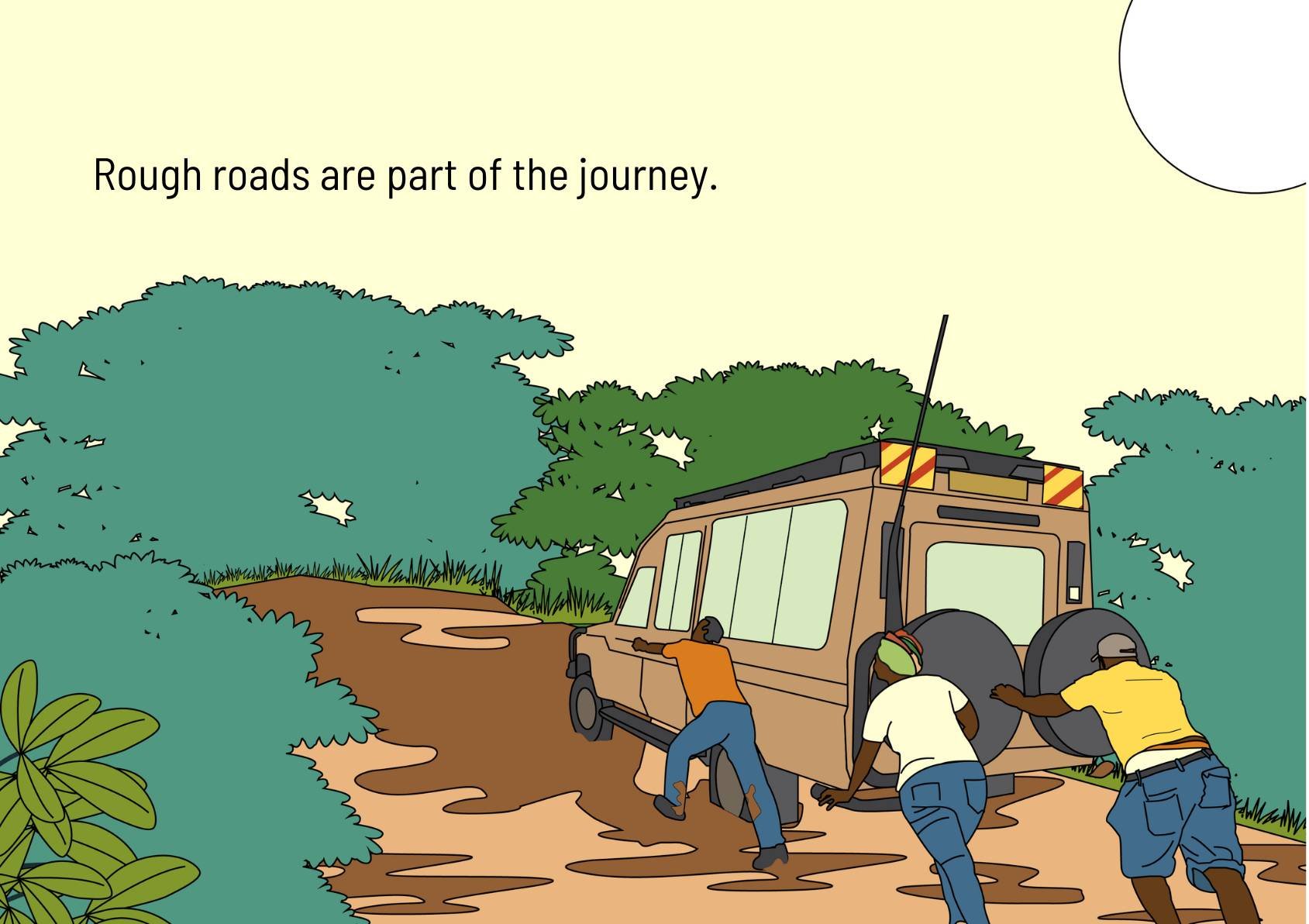Growing Strong | 2021 Highlights
WATCH | Investing in people for nature →
When local organizations realize their full potential, great things can happen…
Maliasili starts and ends every workshop, meeting, training, and gathering with a question for everyone to answer. The “Check in” or “Check out.” Every participant is asked to contribute because everyone’s voices and ideas matter and should be heard.
So here is the 2021 “Check Out” question, answered by all members of the Maliasili team:
What’s the most important thing we achieved or helped our partners achieve in 2021?
Growing our Portfolio →
Stronger together
“Maliasili has linked us to other organizations in the field and in the region, sharing challenges and solutions to the various challenges.”
–Lorna Slade, Technical Advisor, Mwambao Coastal Community Network | Marine Leadership Program Member | Tanzania
Subtitles available (CC)
“Mwambao started off with a small grant of $25,000 and two part-time staff and Maliasili took a risk on us and have helped us along over the years...importantly with our organizational growth and linking with other partners. Today we have a budget of nearly $720,000, which is significant growth. We have a staff of 29 full-time people and 54 part-time people.
Maliasili's help has been through supporting our communications strategy, and very importantly our strategic planning... We've found them very steadfast and supportive, always on the end of the phone, providing support where it is needed, advice at any time. This last year we took a part in the marine leadership program, which has been very good for us... Also, very importantly, [Maliasili] has linked us to other organizations in the field and in the region, sharing challenges and solutions to the various challenges. All in all, our partnership with Maliasili has been fundamental to our growth and success over the years.”
–Lorna Slade, Technical Advisor, Mwambao Coastal Community Network
READ | Conservation with Coastal Communities in the Pemba Channel by Lorna Slade, The WIOMSA Magazine, page 14-17
Mwambao is one of Maliasili's earliest partners. Over the years, we've supported the organization's growth by helping them develop an effective strategy and improve their fundraising, communications, monitoring and evaluation, budgeting, and work planning. They’ve grown and so has their impact.
We’re supporting Mwambao to continue on its organizational journey, facilitating a new strategic plan with their growing team during a week-long session on Chumbe Island, Zanzibar, in November 2021 →
Passing the baton
“[Maliasili] will just lead you, guide you, make you think outside your box, and so give [them your] time.”
–Gladys Warigia, Policy Coordinator | Kenya Wildlife Conservancies Association
Advice to Maliasili's new partners
As part of their orientation to Maliasili, our new partners met with one of our long-time partners, the Kenya Wildlife Conservancies Association, to hear about their organizational growth journey and to get advice for how to make the most of theirs.
"Take it easy, be willing to learn, have that mindset, make the commitment and know that Maliasili isn't the doer - you're the doer. They'll just lead you, guide you, make you think outside your box, and so give time. They're committing resources and time, so please commit the same time and resources... And please have the passion - they're passionate in all they do."
–Gladys Warigia, Policy Coordinator, Kenya Wildlife Conservancies Association (KWCA)
-
"Our journey started when we were quite young, about 3 years old, back in 2016. Our journey was funded as part of a program with USAID and The Nature Conservancy, we didn't know who Maliasili was...they were embedded within a contract document...But Maliasili wasn't just interested in the contract terms. No, they went beyond that and their focus was on growing KWCA.
...It started off with a series of meetings, understanding who we are, understanding our needs from management level to governance structures to operational structures to communications all that. So we packaged that into a yearly work plan...and within each program we had a point person. With comms, Jessie did a great job with us. We had a number of others who did great work with us. There was Elizabeth who helped with governance areas. There was Dickson being coached a lot by Fred, the head of the organization, and so it was a journey that was quite well structured. And every month there were sort of reviews to see how we were progressing...This was not Maliasili doing it, but them facilitating, letting you think, letting you solve your issues, letting you be open and open to learning. It's not the traditional kind of organizational development organization that you know of that's very strict, it's easy and makes it easy to learn, to explore, to identify your needs, and to plan together. And that's the key thing, planning together and just working together.
Now we have grown to have a strategic partnership with Maliasili. We know where our strength as an organization lies, where Maliasili's strengths lie, and how together we can use our strengths to catalyze and build a case for Kenyan conservation, for locally-led conservation.
I think our journey was well thought out from the word go.”
–Gladys Warigia, Policy Coordinator, Kenya Wildlife Conservancies Association (KWCA)Learn even more about our work together and KWCA’s impact here →
Off to new places
“Other NGOs have tried to help us, kind of. But they had a very small grant for organizational development that was for a short-term period. They said they could do a workshop or help with HR. But we needed more flexibility and space to adapt and grow. That’s what we’re looking forward to [with Maliasili].”
–Dr Gladys Kalema Zikusoka, Executive Director | Conservation Through Public Health (CTPH) | Uganda
Healthy communities for healthy ecosystems
In October the Maliasili team took our first trip to Uganda to hold an organizational assessment workshop with our new partner, Conservation Through Public Health (CTPH) down with their founder and CEO, Dr. Gladys Kalema-Zikusoka, to learn more about their work.
“The first time I saw gorillas was as a student, in 1994, when I was conducting research for my veterinary studies. When gorillas picked up scabies from local communities, I quickly began to realize that we can't keep the gorillas healthy without taking care of the people who share their habitats, and without helping to improve their health. So later on in our conservation journey, as we started and founded CTPH, we took the One Health approach that recognizes that health and well being between people and wildlife is closely connected.
Local initiatives, local solutions last longer than externally driven solutions. Sometimes they have to be externally sponsored. But they have to be driven from within. This is what motivates me and excites me. I see this as the long-lasting solution to addressing issues of extinction of wildlife, and habitats, and precious habitats, because the communities who are often pinned as the problem are actually the main solution. If they benefit most, then we don't have to worry about species extinction. So it's important to start with supporting homegrown movements.”
On becoming an even stronger organization
“What made me interested to work with Maliasili is that we've been navigating the rough waters of setting up an NGO. It’s very exciting, but it's also really hard. We never raise enough money to carry out the work that we want and need to do.
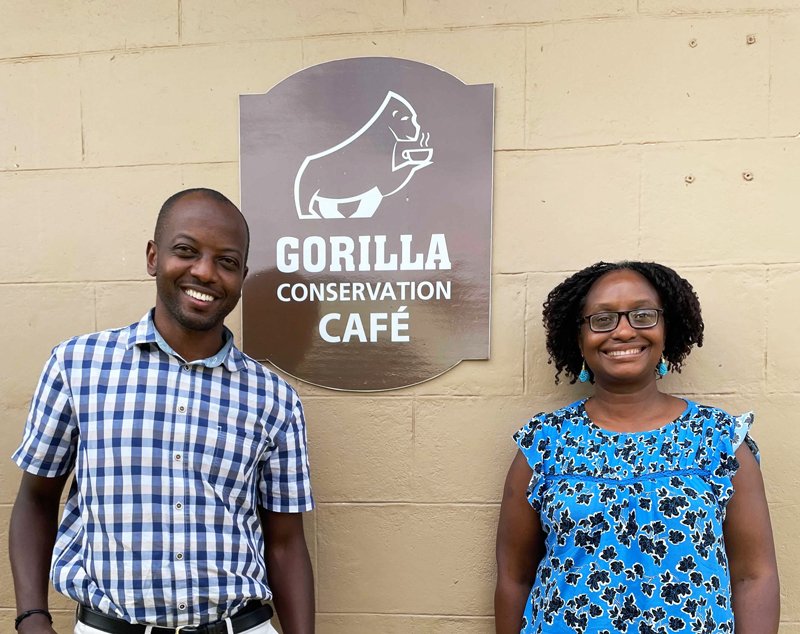
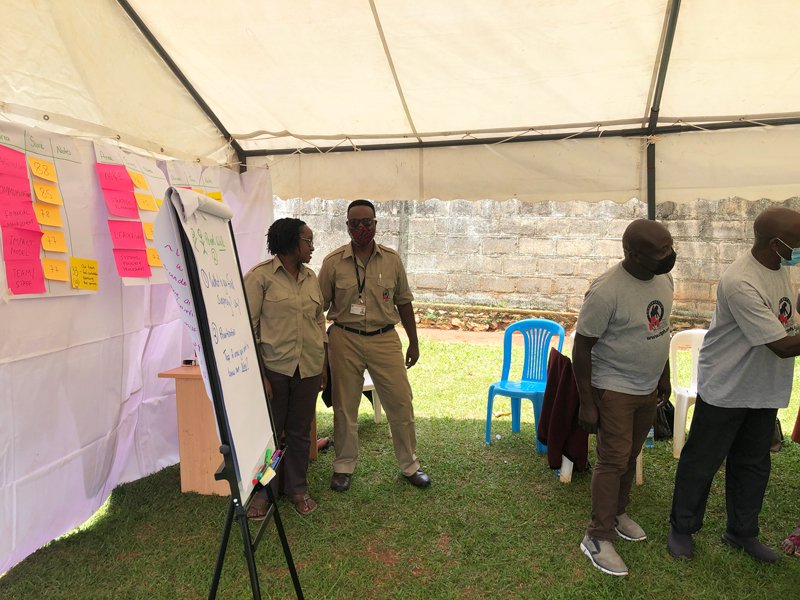

I hope that with Maliasili we have an opportunity to become more focused, to focus more on our strengths, build our team, and grow our impact. Other NGOs have tried to help us, kind of. But they had a very small grant for organizational development that was for a short-term period. They said they could do a workshop or help with HR. But we needed more flexibility and space to adapt and grow. That’s what we’re looking forward to.”
–Dr. Gladys Kalema Zikusoka, Executive Director of CTPH & UNEP 2021 Champion of the Earth - Science and Innovation.
Communities remain at the core
“Trust traditional knowledge. Coastal communities have incredible mastery and expertise. Involve the communities in the co-creation of the networks. They are your main stakeholders and have to feel a sense of ownership.”
–Vatosoa Rakotondrazafy, President of the Board | MIHARI Network | Madagascar
Maliasili interviewed Vatosoa Rakotondrazafy earlier this year. She is a passionate Malagasy, who is the President of the board of Maliasili’s partner MIHARI, a network established in 2012 to link isolated coastal communities and allow community leaders to share ideas and successful models through peer-to-peer learning.
Vatosoa shared her thoughts on community conservation and organizational development. Below are excerpts from the interview.
On community conservation
“Trust traditional knowledge. Coastal communities have incredible mastery and expertise. Involve the communities in the co-creation of the networks. They are your main stakeholders and have to feel a sense of ownership.”
On strategic planning
“This [strategic plan] has played a key role in the network’s development. A crucial step is that we’ve made the process inclusive. The strategic plan meets the objectives of the network and fits all the members. The strategy will guide the network for the next five years and will provide clarity on our priorities. In the past, MIHARI’s work has largely been dependent on urgent needs, and we’ve been doing things on the go. The strategic plan will give us a much-needed guide.
–Vatosoa Rakotondrazafy, President of the Board, MIHARI
Media Highlights→
Follow us on Social Media
Growing leaders →
A personal growth journey
“The biggest lesson learned thanks to [African Conservation Leadership Network] ACLN: not to be too regimented about leadership. Leadership has to be adaptive and human.”
–Angus Middleton, Executive Director at Namibia Nature Foundation | African Conservation Leadership Program Member (ACLN) | Namibia
Conservation leadership is not easy. Leaders across the broad field of community-based conservation face numerous and often urgent challenges - from climate change to securing adequate funding - which puts them under tremendous pressure. Maliasili's leadership programs strengthen these African conservation leaders and their organizations, providing them with the tools, knowledge, platform and peer community to be more empowered and more effective.
Angus Middleton, the Executive Director at Namibia Nature Foundation and a member of the African Conservation Leadership Network (ACLN), talks about his leadership growth journey and key lessons learned along the way.
I was initially critical…
“At the beginning of my time with ACLN, I was tough and critical. I arrived and wanted to maximise the opportunity to further develop the Namibia Nature Foundation. The initial process then confused me, especially the first module, which focused on ‘me’. It took time to get into it and understand the journey.
Consequently, the personal learning ended up being great, and it really resonated with me and served to highlight that we spend too little if any time on ourselves as leaders. The coaching and co-learning support were also hugely useful as a shared experience. ACLN came at the right time for the Namibia Nature Foundation - it helped us reflect on our work internally. It helped improve our internal systems like communications and workflow, still not perfect but a lot better.”
-
“Our ACLN cohort had a strong voice when we came together to discuss COVID - because it happened during our course and was very much a shared experience.
The meetings that we had trying - together with Maliasili - to figure out how to respond were defining of our cohort - because of it, I approached the pandemic differently. In the past, I would have approached it with rigidness and professionalism but instead, I took a more messy, human approach that has ebbed and flowed in response to the “corona coaster” but remained consistent. The NNF responded rapidly to COVID, we closed our offices before the country shut down, we set up IT for remote working months ahead, we moved quickly to work in safer but still reliable ways with the communities that we serve. Although we struggled a bit with vaccination we have learned from others, like the Grevy’s Zebra Trust, and made progress. The biggest lesson learned thanks to ACLN was not to be too regimented about leadership. Leadership is not hierarchical and in our context has to be adaptive and human.”
Everyone has something to offer...
“Everyone has something to offer; let down your guard and enjoy the guided journey. I remember reading other people's CVs and was somewhat intimidated on one hand and challenged on the other, but then remembered that everyone has something to offer. "Take your costume off and jump in the water". You have to be exposed, jump in the water, and be immersed to get the most out of it. Daunting? Yes! Rewarding? Incredibly so! I loved learning about myself through different lenses, being in a peer group of incredible diversity, and the shared experience. Knowledge held is power, knowledge shared is empowerment.”
–Angus Middleton, Executive Director at Namibia Nature Foundation.
Building on new relationships
"The African Marine Conservation Leadership Program was a great course. Continue growing this cohort to greater heights to become the leading players in the marine space".
–Patrick Kimani, Director at Coastal and Marine Resource Development (COMRED) | Marine Leadership Program Member | Kenya
Peer learning and support
In April we concluded the first African Marine Conservation Leadership Program (AMCLP), which aims to bolster the skills, confidence, and effectiveness of local and national marine conservation leaders in coastal east Africa and the Western Indian Ocean region. We redesigned our program to work online and were excited that we could still build intimacy and trust through an entirely remote experience.
Patrick Kimani is the Director at COMRED, an organization that works to advance the well-being of coastal communities in Kenya. He was one of the 17 participants in the first cohort.
Following the African Marine Conservation Leadership Program (AMCLP) and building on the new linkages forged during the program, Patrick and his team recently hosted a peer learning exchange between marine conservation partners in Kenya and Somalia. Blue Ventures (Maliasili's partner in the AMCLP) brought their partners from Somalia - including Adeso, another cohort member - to learn and share from COMRED on marine co-management and livelihoods development. Topics covered include alternative income generation activities, best practices for governance, data management, monitoring, and surveillance.
It's exciting to see this type of knowledge exchange happening in marine space, a crucial ingredient in creating a long-term impact for the ocean and the people who depend on it to survive.
Exploring career paths in conservation
“Besides improving our professional skills through this internship, particularly in research, content management, and data analytics, we also grew as individuals who are still learning how to navigate the career space.”
–Doris Maduka, Maliasili Communications Intern | African Leadership University | Nigeria
Building conservation talent
Maliasili's internship program is helping to nurture the next generation of conservation talent. The conservation sector struggles to attract young and growing African professionals. Maliasili aims to bridge this gap by working with our existing partners, and like-minded institutions like the African Leadership University (ALU), to provide exciting conservation learning opportunities.
In 2021, we organized four students from ALU - Doris Maduka (Nigeria), Hussainatu Bah (Sierra Leone), Memusi Mollel (Tanzania) and Raini Sydney (Kenya) - to gain meaningful internship opportunities with us and our partners.
Doris, who interned with Maliasili's communications team, said:
"Our nine weeks working with Maliasili and its partners, SORALO and Grevy's Zebra Trust, has been a great learning experience that has allowed us to grow as individuals and gain new professional skills. It has also widened our knowledge and understanding of the conservation field and its current opportunities, and we are grateful for this fantastic opportunity."
In this blog post, Doris and the other interns reflect on the four things they learned during their internships.
This issue of the Maliasili Reader, drafted in partnership with ALU, highlights how you can make internships a win-win.
Growing funding for community conservation →
Flexible Funding = Impact
“There is so much you can realize when you have flexible funding and this is something we’ve really experienced…The Maasai Landscape Conservation Fund allowed us to tap into [important] opportunities when they arose and I believe that is something other organizations need to focus on…”
–Daniel Sopia, CEO, Maasai Mara Wildlife Conservancies Association (MMWCA) | African Conservation Leadership Program Member | Kenya
“Community conservation organizations have been disadvantaged quite a lot when it comes to funding and receiving large funding... Sometimes we end up with opportunities that present themselves and it becomes really difficult when we don’t have flexible funding. The Maasai Landscape Conservation Fund has really allowed us to tap into those opportunities when they arise and I believe that is something the other organizations need to focus on - there is so much you can realize when you have flexible funding and this is something we’ve really experienced.
A very quick example was that... some of the communities we’ve tried to strengthen governance with over the years have been very difficult. But an opportunity came and thanks to MLCF we were able to have the resources available to move quickly and without limitations and within three months we had really realized good results. So if you have to go around and spend all your time looking for realignment or reallocation of funding and resources to be used for that purpose the opportunity would have been already lost. It’s really very important for community orgs to access flexible funding because that is where they can create a big difference…”
–Daniel Sopia, CEO, Maasai Mara Wildlife Conservancies Association
Introducing the new MMWCA Strategic Plan
MMWCA has grown significantly since we began working with them in 2016. We facilitated the development of their new strategic plan for the next five years, a plan aimed at accelerating impact across the Mara ecosystem.
Learn more about how we’re supporting our partners to achieve their mission.
Growing our team →
Our growing team is enabling us to support more outstanding local organizations, while bringing new perspectives and experience to our work.
Changing the face of conservation
“When I started in conservation, the space was very expat, male heavy. I didn’t see a lot of people like me in leadership positions, and I didn’t think there were opportunities for me. But I’m glad that’s changing. I’d often be the only local young female in a room. That does something to your psyche. That’s why I left the conservation space to pursue my Masters in climate change and sustainable development… That’s one of my reflections from my own journey. I shied away from it early on, but not anymore. There’s some change happening, and I would like to bring African women alongside me to grab these opportunities together.”
–Omagano Shooya, Maliasili Portfolio Manager | Namibia
Facilitating others for change
“What I enjoy about Maliasili is that it's not me going to our partners as an expert trying to say, ‘this is how you should do things’ and ‘this is what I think the solutions are to the conservation challenges that you have’. Instead, it’s me going, ‘you guys already created what you're trying to do, you know what needs to be done. Now let's just get some clarity about it. Let's get some focus, make sure it's very strategic.’ When they do that, that’s when we multiply impact.”
–Akshay Vishwanath, Maliasili Portfolio Manager | Kenya
Akshay was honored as a Top 100 Young African Leader in 2021
“Our success is our partners’ success. This is what we live by in Maliasili. And I am confident that the current strategic planning process at IMPACT will help them be even more successful.”
In this blog post, Akshay talks about his process and experience in helping to strengthen iMPACT, an indigenous land rights organization based in northern Kenya.
Retelling the conservation story
“Conservation is evolving rapidly, and the sector looks very different now than it did a decade ago. Maliasili offers a platform for me to participate in this evolution by working closely with an incredible group of innovative and passionate partners. It's a privilege to find ways to share untold conservation stories with the world and amplify the voices of these local, grassroots conservation organizations.”
–Wanjiku Kinuthia, Maliasili Communications Manager | Kenya
At the request of leaders within our networks, we conducted a media engagement workshop that focused on understanding what makes a good story, identifying the right platforms, how to establish media relationships and more.
This CNN feature - facilitated by Maliasili - highlights the critical work of Grevy’s Zebra Trust, told through the eyes of Research Manager, Sheila Funnell.
Wanjiku recently joined renowned photographer Ami Vitale to co-author an article in the Guardian, featuring the work of one of Maliasili’s partners, CHAT.
Looking ahead →
To address biodiversity loss, climate change, and environmental degradation, we need more outstanding local organizations that can drive positive change for people and nature on a growing scale.
OUR GOALS ARE AMBITIOUS AND BOLD.
By 2025 we aim to:
Triple the size of our portfolio supporting a total of 90 organizations across Africa and Madagascar
Train, support, and connect 200 high performing local conservation leaders
Mobilize at least $40 million in new funding for our portfolio partners
Stimulate at least $100 million in new funding commitments for community-based conservation organizations across the conservation field
Invest in Maliasili →
We want your support
Invest in Maliasili - We have a big vision and ambitious goals and we need additional resources to invest in our growth
Invest in our portfolio - When you invest in our portfolio you know the organizations have been vetted and strengthened, and with more money, their impact will grow.
Invest in Africa’s next generation of leaders - Your support to our leadership program will help secure the future of African conservation.
Become a stronger organization - Learn more about how you can work with us to grow and strengthen your organization and your impact.
